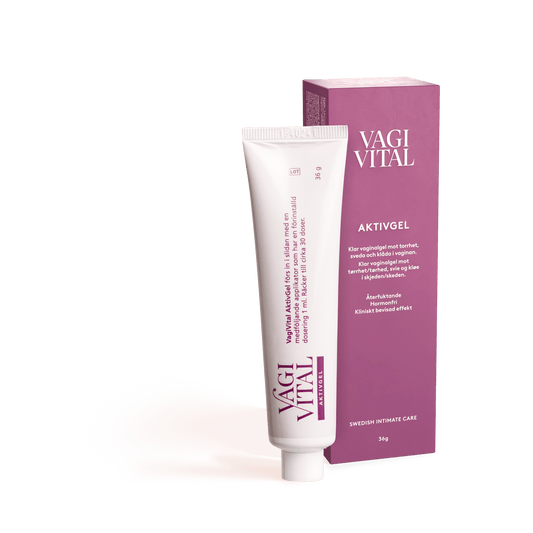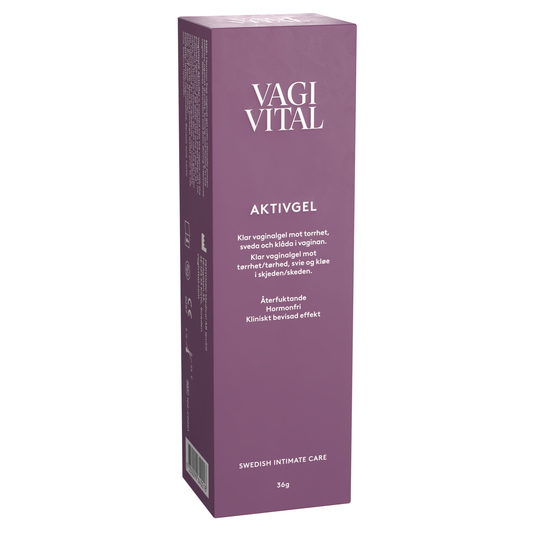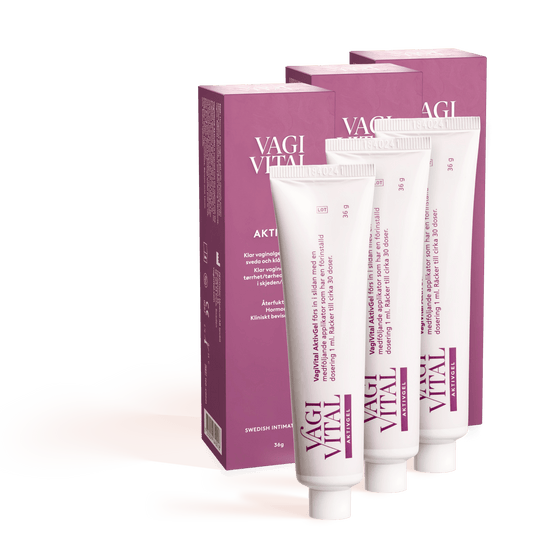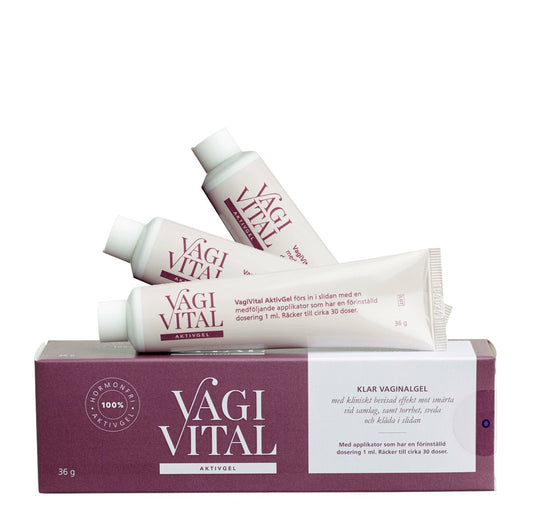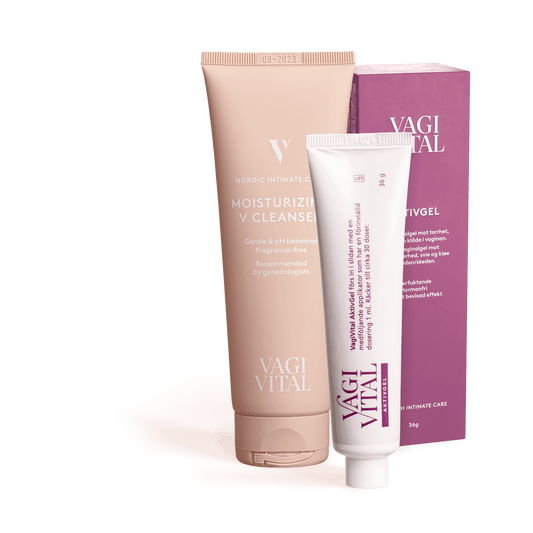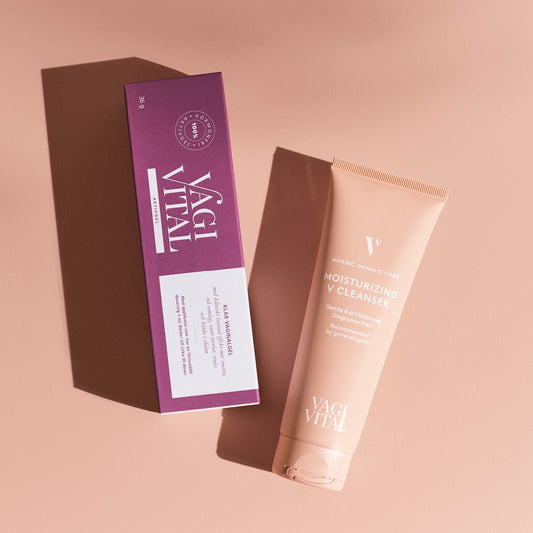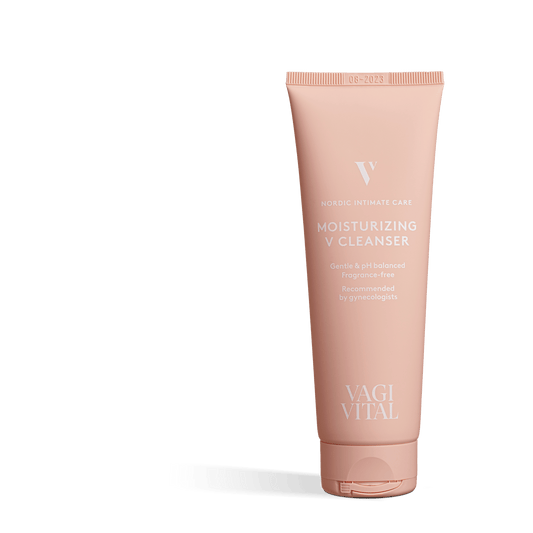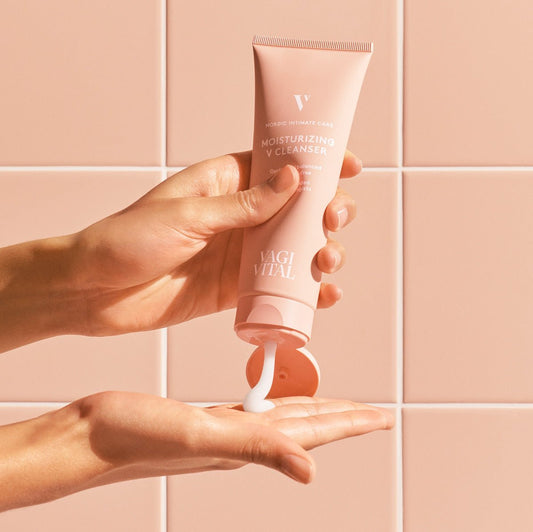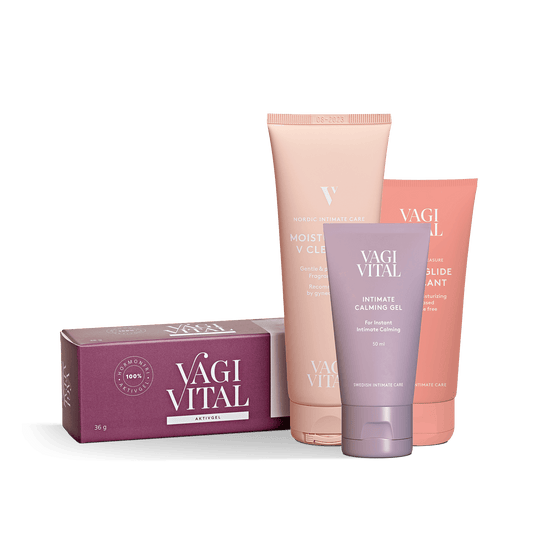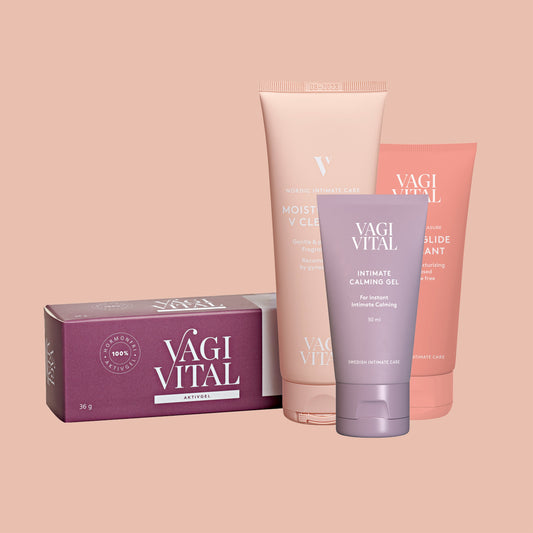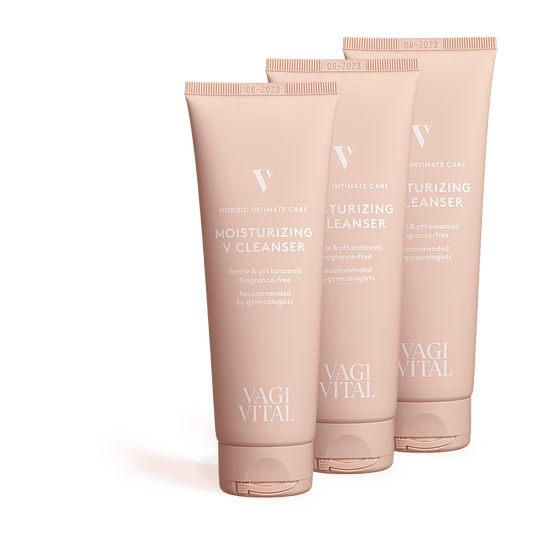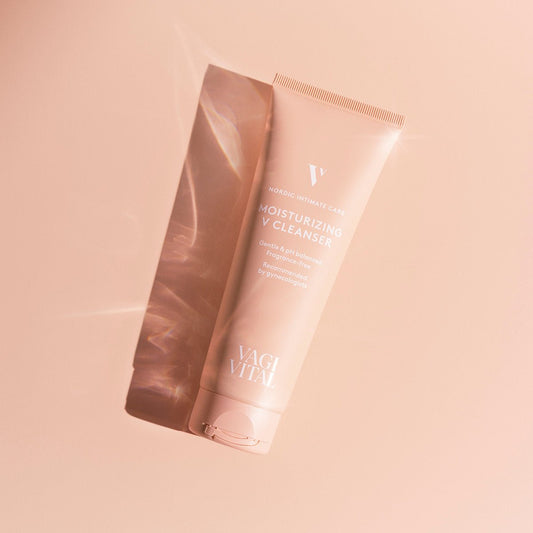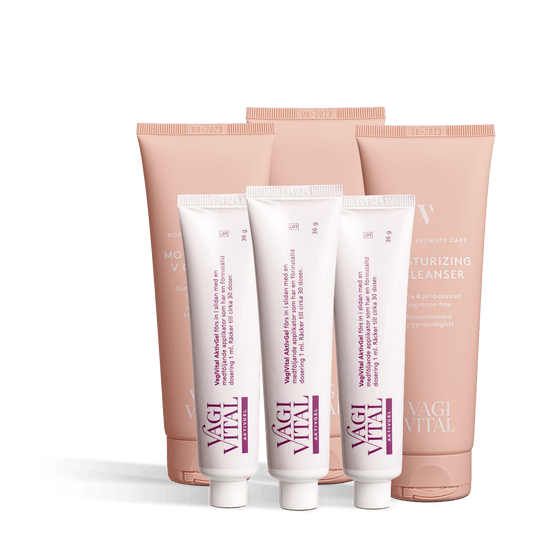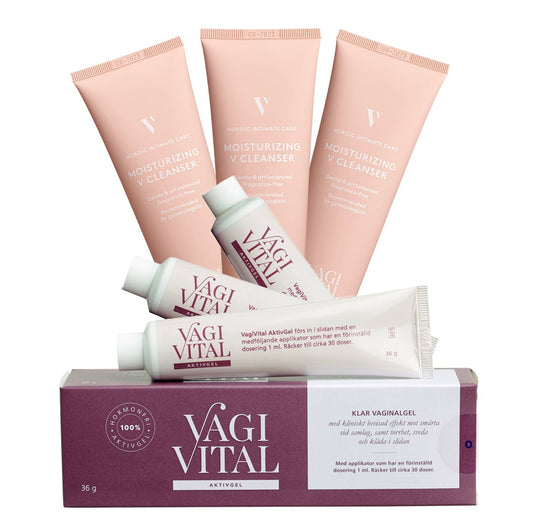Menopause and the skin
THE SKIN AND MENOPAUSE
It is a bright sunny September Saturday and I am at Skansen with my whole family. My parents are visiting from Gothenburg to be with us. We sit with our faces turned towards the warm sun and enjoy a moment together with coffee and hot chocolate from a brought thermos. I close my eyes and let the sun's rays warm my (already) winter-pale skin and listen to the conversations when my mother suddenly says: "Fanny, it's unbelievable - you hardly have a single wrinkle and you are 50 years old!" But that's not entirely true. I am actually "only" 49 years and 9 months. Fair is fair. And I also have plenty of laugh lines and my smile wrinkles can make me look like a sad bulldog when I am serious. But for my mother, who has a different perspective, I hardly have a single wrinkle. Because that's how it is, right? Only when we get older do we gain perspective on aging? When I was around 10 years old, I thought crow's feet were the most beautiful thing there was. Then one day I had them myself. The perspective on aging has changed over time. Aging itself is not really what bothers me, but what challenges me is that little shift in the mirror image. That I don't quite keep up. But I have decided to embrace the small changes in my skin as life's signs of experience and wisdom ❤
THE SKIN DURING MENOPAUSE
Most women who have entered menopause notice that it also affects the skin. What exactly happens to the skin during menopause? Let's start from the beginning. First and foremost, our beloved estrogen hormones begin to pack their bags and take a break. This hormone, which previously kept our skin hydrated and radiant, simply retires. So what does that mean for the skin and what affects the skin during menopause?
FIND OUT IF YOU ARE IN PERIMENOPAUSE/MENOPAUSE
VagiVital Menopause FSH test for perimenopause/menopause is designed to provide an indication if you are in perimenopause/menopause by measuring certain hormone levels. It can help you gain a better understanding of the symptoms you are experiencing and assist in deciding on possible next steps, such as seeking professional medical advice or exploring appropriate treatment options. You can find the VagiVital Menopause FSH test here https://vagivital.se/products/vagivital-menopaus-fsh-test
🌸Decreased estrogen levels
One of the most noticeable hormonal changes during menopause is decreased levels of estrogen, a female sex hormone that has a significant impact on the skin. Research has shown that estrogen is important for maintaining skin health by:
- Promote collagen production: Estrogen helps preserve the skin's elasticity by promoting collagen production, which keeps the skin firm and youthful.
- Maintain moisture balance: The hormone helps the skin retain moisture, preventing dryness and dehydration.
- Regulate sebum production: Estrogen plays a role in controlling sebum production, which can affect oily skin and acne.
🌸Dryness and reduced elasticity
Due to decreased estrogen levels, many women in menopause experience an increase in skin dryness and reduced elasticity. Studies have documented that this dryness can be the result of decreased moisture retention in the skin, meaning the skin has a harder time retaining and binding moisture, as well as reduced sebum production.
🌸Increased sensitivity and irritation
Decreased estrogen levels can also make the skin more sensitive and prone to irritation. Research has shown that women in menopause may experience increased sensitivity to skincare products and potential allergens. The skin also functions as a barrier that protects the body from harmful external factors. Decreased estrogen levels can reduce the skin's ability to retain moisture and protect itself. This can make the skin more vulnerable to environmental impact.
🌸Increased risk of pigmentation changes
Some studies have also linked decreased estrogen levels to an increased risk of pigmentation changes, especially in women with fair skin.
WOMEN ARE AFFECTED DIFFERENTLY
You may wonder why some women's skin seems to fare better than others? Women are simply affected differently during menopause, which also applies to their skin and is due to a combination of several factors including genetics, lifestyle, and hormonal variations.
🌸Genetics
Genetics play a significant role in how our skin ages and is affected by menopause. Some people naturally have a better skin barrier function, with more collagen and elastin in the skin and a higher capacity to retain moisture.
🌸Collagen
Collagen is one of the most important proteins in the body and constitutes a fundamental component of many tissues. In the skin, collagen is the main component of the dermis, the deeper layer of the skin. It gives the skin its structure and support, helping to preserve its firmness and youthful appearance. Collagen is also found in hair and nails, where it contributes to their structure and strength. With aging, collagen production in the body decreases, which can lead to loss of skin elasticity and cause the formation of wrinkles.
🌸Elastin
Elastin is an important protein naturally found in the skin and other tissues in the body. It is a key component of the skin's connective tissue and helps give the skin its elasticity and ability to return to its original shape after being stretched or compressed. Elastin works together with collagen to provide the skin with its structure and support. Elastin makes the skin resistant to damage and tears when exposed to pressure or stretching. With aging, elastin can break down, which can lead to loss of skin elasticity and the appearance of wrinkles and sagging skin.
🌸Hormonal Variations
Although decreased estrogen levels are a common denominator during menopause, the exact rate and degree of these changes can vary from person to person. Some women may experience a gradual decrease in estrogen over several years, while others may have more sudden and dramatic changes. This hormonal variation can affect how quickly and noticeably the skin ages.
🌸Lifestyle
Lifestyle factors also naturally have a significant impact on skin health during menopause. Women who eat a healthy diet rich in antioxidants and avoid smoking and excessive alcohol consumption tend to have better skin health. Regular exercise and stress management can also help maintain the skin's vitality.
🌸The hormonal lottery
Some women are lucky to have a genetically high level of collagen and elastin in their skin, which provides a youthful texture and firmness. Women who do not have a genetic predisposition for skin problems may notice less impact on how their skin looks during menopause compared to those who have a hereditary tendency to develop skin issues. In other words, genes can play a role in how much menopause affects the appearance of the skin.
THE SKIN IN THE VAGINA
Even the skin in the vagina can be affected by menopause. Changes in the vaginal mucosa are common and can be a source of discomfort during menopause. Here is what happens based on research and studies:
🌸Thinning of the vaginal mucosa
During menopause, estrogen production decreases dramatically. Estrogen is responsible for maintaining the thickness and moisture of the vaginal mucosa. When estrogen levels drop, the mucosa becomes thinner and less elastic. This can lead to vulnerability and increased sensitivity, which can cause discomfort during sexual activity.
🌸Vaginal Dryness
Decreased estrogen production can also result in vaginal dryness. This dryness can be troublesome and sometimes painful. Studies have shown that up to 50% of women in menopause experience vaginal dryness.
But don't worry, there are solutions to this problem too! One such solution is VagiVital AktivGel which helps to moisturize and strengthen the vaginal skin. It's like a moisturizing rain shower for your private garden❤
Read the blog on how to understand and manage dry mucous membranes here!
🌸Increased risk of infections
The thinner and drier mucous membrane in the vagina can also increase the risk of vaginal infections, such as yeast infections and bacterial vaginosis. This is due to changes in the natural balance of bacteria and fungi in the vagina.
Read blog about bacterial vaginosis and foul-smelling discharge here
🌸Urinary incontinence
Changes in the vaginal skin and muscles can also affect bladder function. Many women in menopause experience incontinence problems, including stress incontinence (leakage when coughing, sneezing, or exerting) and urge incontinence (a feeling of needing to urinate frequently).
You can find the VagiVital Menopause FSH test here https://vagivital.se/products/vagivital-menopaus-fsh-test
TAKE CARE OF YOUR SKIN DURING MENOPAUSE – 7 SCIENTIFICALLY BACKED TIPS
Menopause is a journey that most women go through in different ways. It is a time of changes, both physical and emotional. Here are some effective ways to take care of your skin during this life phase, based on scientific research
1. Use a gentle skincare routine
Research has shown that it is important to use gentle skincare products during menopause. Choose a mild cleanser that does not dry out the skin. The skin can also become more sensitive during this time, so avoid products that may be irritating. Products containing hyaluronic acid and glycerin have been shown to be effective in retaining skin moisture.
2. Sunscreen
Research has clearly shown that UV radiation from the sun can damage the skin and cause premature aging, including wrinkles and pigmentation spots. Therefore, use a sunscreen with at least SPF 30 daily to protect your skin from harmful UV rays. This will also reduce the risk of skin cancer.
3. Anti-Aging Skincare Products
There are a variety of anti-aging products available on the market. Studies have shown that ingredients such as retinol, antioxidants (such as vitamin C), and peptides can help reduce wrinkles and improve skin elasticity.
4. Healthy Lifestyle
Your diet affects your skin more than you might think. Studies have shown that a balanced diet rich in antioxidant-rich foods like fruits and vegetables can help fight free radicals and promote healthy skin. Also drink enough water to keep your skin well hydrated. Avoid excessive alcohol consumption and smoking, as these factors can accelerate skin aging.
5. Exercise
Most of us already know that regular exercise has many health benefits, but not everyone may be aware that it can also have a positive effect on your skin. Exercise promotes good circulation, which can give a healthier skin tone and texture. So take a walk, do yoga, or engage in some form of exercise that you enjoy.
6. Moisturize the Vagina
Menopause can also affect the sensitivity of the vaginal skin, and a vagina as dry as the Sahara Desert is a torment. VagiVital AktivGel has undergone clinical studies and is designed to moisturize the driest vaginal mucous membranes. AktivGel is a hormone-free active gel that relieves and cures symptoms in the intimate area such as dryness, irritation or itching in the intimate area, discomfort during intimate intercourse, or pain during urination. In the clinical studies we have conducted with VagiVital AktivGel, we see very good results after 30 days (4 weeks). The results improve further at the follow-up after 12 weeks. Therefore, we normally recommend daily use for 12 weeks (3 tubes) and then switching to use as needed. In user surveys, most respond that they use the product daily for 30 days. After that, the most common is to switch to use every other or every third day.
You can find VagiVital AktivGel here!
7. Regular Skin Checks
Skin cancer is of course serious, but if detected early it can often be treated successfully. Therefore, perform regular skin checks to detect any changes or signs of skin cancer at an early stage. If you notice anything unusual, contact a dermatologist immediately.
8. Stress Management
Menopause can be a stressful time with many physical and emotional changes. Research has shown that high stress levels can negatively affect your skin. Consider relaxation exercises such as meditation or yoga to manage stress and promote healthy skin. There are also many meditation apps available today that can be a step towards managing stress.
Menopause is a journey that every woman goes through in her own way, and it affects us not only emotionally but also physically, including our skin. A skin that has been there since we were born. That has protected and embraced us. Your skin is an important part of your body and it deserves to be cared for and loved throughout your life, regardless of age. So embrace the small changes as life's signs of experience and wisdom. And honestly, I still think crow's feet are some of the most beautiful things there are ❤
Take care of yourself and Stay Pussytive!
/Fanny
Recommended products for you
- Choosing a selection results in a full page refresh.
- Opens in a new window.
